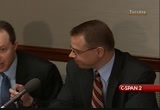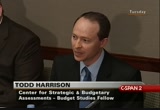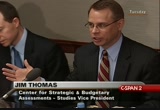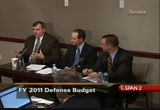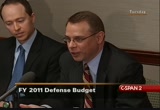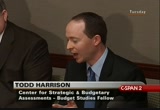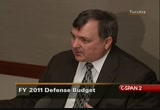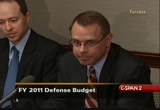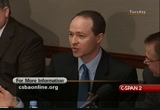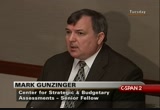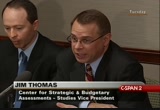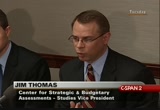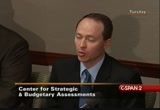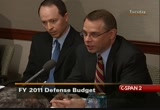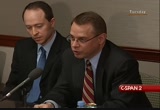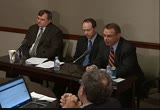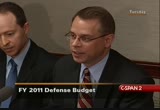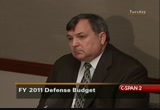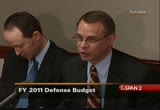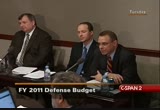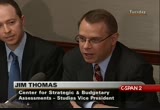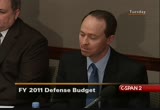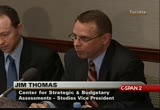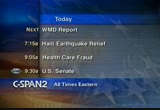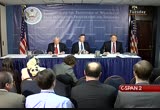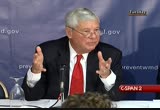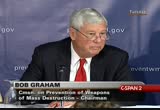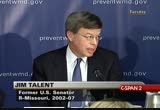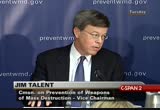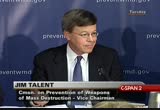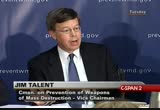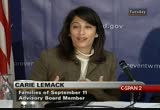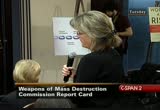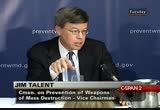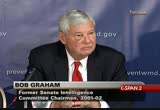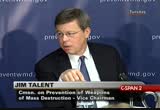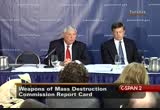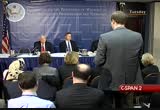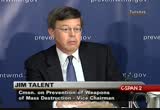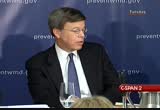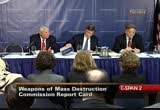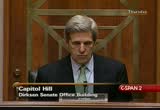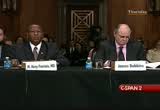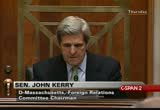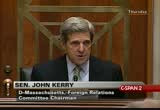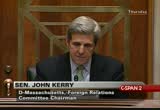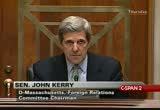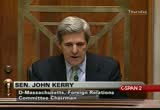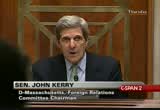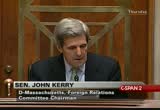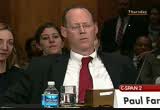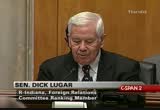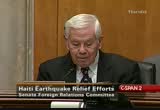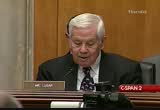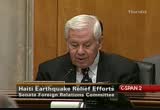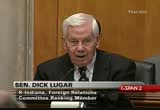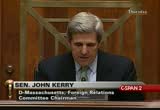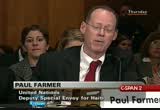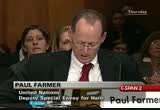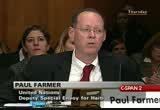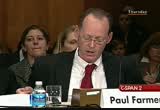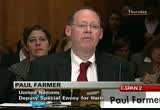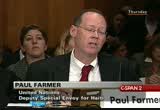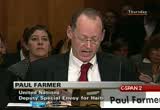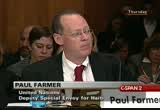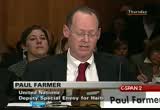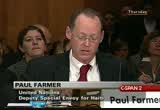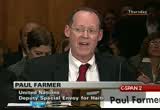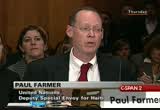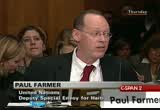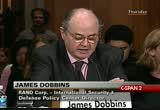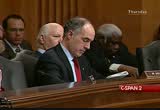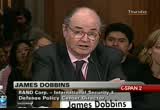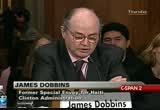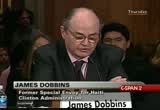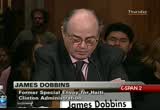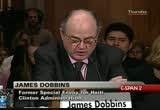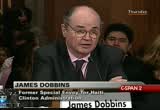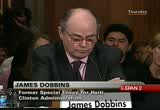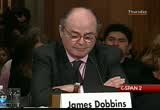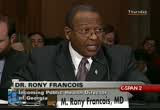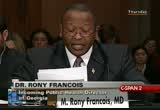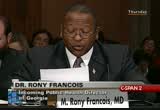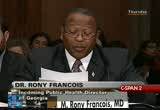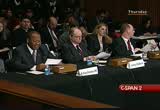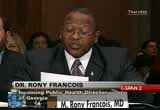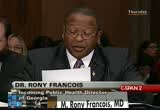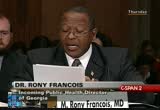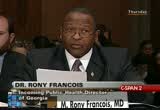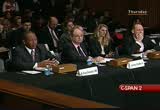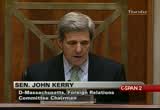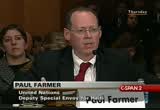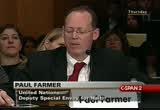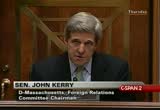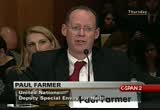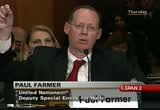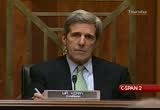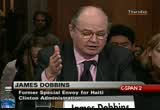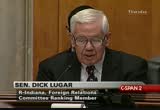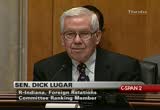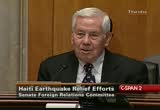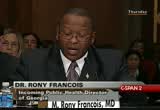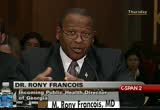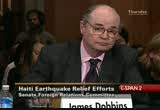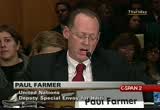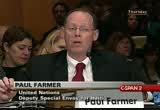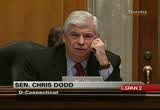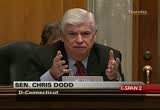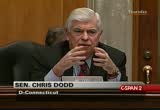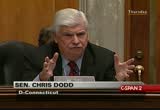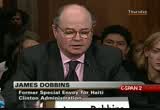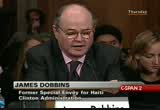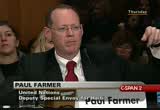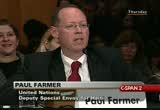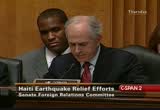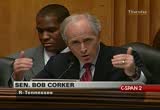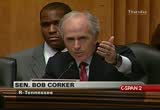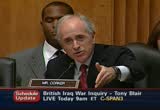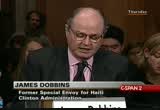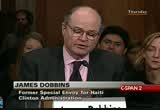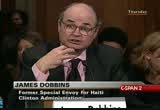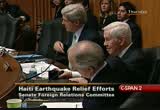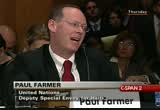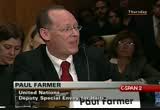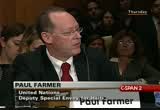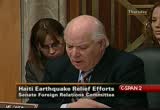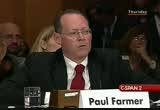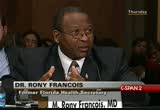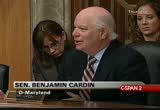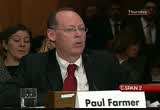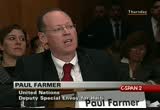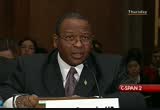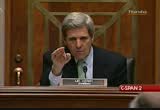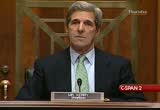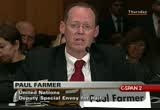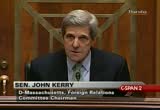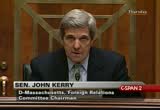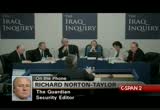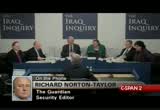tv Today in Washington CSPAN January 29, 2010 6:00am-9:00am EST
6:26 am
washington. this is 45 minutes. >> good morning. first we will ask you to turn of sophos or at least put them on beep. i am the director of the commission on the prevention of weapons of mass destruction proliferation and terrorism. our chairman, senator bob gramm and vice chairman senator jim talent will first provide an overview of the report card dewaal half. we will then have some brief remarks from carey who is representing the results of 9/11 and will have to lead back for another hearing of on the hill. and the will of time for q&a after that, so mr. chairman, the floor is yours. >> thank you for a much, mr. kroll larson and for the great leadership that you've provided over this past year. we have started the day with breakfast with families of 9/11. in many ways they are responsible not only for our
6:27 am
commission but for the 9/11 commission. it was their emphasis of the importance of understanding what happened in order to prepare america to avoid a repetition that led to the creation of the 9/11 commission. one of the findings of the 9/11 commission was the ultimate threat to the united states was when the worst weapons fell into the hands of the worst people. that led congress to create our commission to evaluate what is our level of preparation to avoid the proliferation of weapons of mass destruction, particularly into the hands of terrorists. so it was appropriate that we started the day by giving back to the beginnings of this effort with families 9/11. our report on today comes eight years after 9/11. it comes one year after the publication of the report which
6:28 am
was entitled world at risk, purposefully titled to indicate this is not one nation's problem, this is a global problem because it is the earth which is at risk, and one month after the failed attempt at an aviation bombing on christmas day there is some good news. the good news is particularly in the area of nuclear terrorism that the trend lines here seem to be running in the right direction. president obama has taken major steps to revitalize the non-proliferation regime and to encourage needed international cooperation. he's committed significant time and energy and resources against iran, north korea and in the pakistan situation although
6:29 am
progress there remains loose. but our fundamental threat assessment of 14 months ago stands to today. one is it is more likely than not under the current circumstances and without decisive and urgent commitment that there will be a weapon of mass destruction used by a terrorist organization some place on earth between now and if the end of 2013. what that says is the accused more than 20% of the time available to us to better prepare to prevent or respond to that attack and with mixed results in terms of how well we have used those 14 months. we found second it is more likely the form of attack will be a biological rather than nuclear attack. there is an article in today's
6:30 am
"washington post" which discusses a report issued by one of america's eminent intelligence officers, mr. larson who was with the cia and headed the unit at the department of energy and is now at the kennedy school making exactly the point that our greatest threat today is a biological weapon in the hands of a terrorist. we also found in december 2008 that in spite of all the things we were doing because our adversaries were moving at a faster pace than we were that we were losing ground.
6:31 am
in our report card, we gave three a grades. we gave an a to the administration's review of domestic programs to secure a dangerous pathogens. we gave an a to the interagency by yo forensic strategy which is a strategy designed to allow us if we are attacked to know from whom that attack was launched. and the administration received an "a" for finalizing the reorganization of the national security council, which brought together to disparate groups into a single and we think more effective entity. the was worth three "a's."
6:32 am
i'm going to focus on her feet "f" we gave. the first was on the area of bioterrorism preparation. our basic finding is that while with nuclear prevention by lockdown is a reasonable strategy. we know it with intolerance is how many nuclear weapons there are in the world. we know where they are and now the challenge is to assure ourselves the are being well secured. with a biological, none of those things apply. biological weapons in many cases are the product of nature, anthrax is the result of the de cable lines. many of those that durham ann curry it has become increasingly [inaudible]
6:33 am
-- deals with the biological sciences to with the negative these pathogens. we believe the strategy that has the greatest potential is a strategy of the ability to respond. to reduce the impact of such an attack, and even as a deterrence to the attack. in terms of the deterrence, our adversaries are only going to have a limited number of biological weapons. al qaeda will no doubt look to where it can accomplish its objectives. chaos, mass panic, high level of death and will use those weapons against those targets it considers to be the least well prepared. so one of the ways you can most effectively detour and attacked
6:34 am
is to be high on that list of capacity to respond. also if you are attacked if you are well prepared to have the ability to reduce the number of debt. there may be thousands killed but there will not be tens or hundreds of thousands of people killed if you have made the investment in the appropriate response. b.c. response is being analogous to a chain with about a half-dozen links beginning with surveillance, knowing that you actually are under attack. diagnosis, what is the nature of the attack, communication, letting the first responders no the nature of the attack, having in place the therapeutics required to respond to the attack. triage the people who have been affected so that you are providing appropriate medical services based on the condition of the individuals, and at the end of the process particularly
6:35 am
with anthrax a cleanup. we know how long and how expensive the cleanup of a few buildings in this city turned out to be in late 2001. we are talking about a whole city that would have to be cleaned up after a potential anthrax attack. we believe we are inadequately prepared in every one of these links and the time is increasingly short to with a major national effort, and i use the word national to indicate at the federal, state, local and citizen level to strengthen our capacity and respond to a biological attack. these are not something costs if we are fortunate enough to avoid a biological attack because the same capabilities here are what we would need in an attack by nature itself. we learned some important worth to legal lessons during h1n1 one
6:36 am
of which was we are not prepared to develop vaccines in the quantity and in the timeframe necessary to respond to an attack by nature. we hit six months to get ready for h1n1 and zero time to get ready for a terrorist attack. so we get our efforts and "f" and i hope i will be a stinging indictment and message to our national leaders. we also gave an "f" to the congress. the 9/11 commission has now for six years been urging congressional reform so that they could do a better job of all surprising, appropriating some allocating resources and overseeing with the executive agencies are doing. we do not believe that conagra's is totally organized in a manner to do that in fact it's organized in a manner that will
6:37 am
almost inevitably result dysfunctional behavior as it relates to this activity. and if the third "f" goes to a critical error and that is human-resources. across the national security institutions, intelligence, the military, our scientific laboratories we are seeing massive retirements of baby boomers who spent their lives understanding the nature of the challenges preparing us to respond. we have not developed a system that will bring in to those services people who are prepared, trained to expeditiously move into positions of responsibility. the former head of the cia and the national security agency said once they have hired a bright young bachelors degree graduate into one of the intelligence agencies it takes five years before they can be
6:38 am
effective in the regions of the world where we most need assistance because of the difficulty of mastering the language is that are necessary to be an effective intelligence officer. we think that is another area which there has been woefully little action to the great disadvantage of the united states. we believe in the year ahead of these three "f" grades are all susceptible to a considerable improvement after is a new level of awareness of their importance and a commitment at both the administration and the congressional branches of government to do so. finally, a word on citizens and community preparedness. i spent several weeks this summer in england talking to a
6:39 am
number of their national security officials and a recurring theme was that there had never been in the history of the united kingdom a terrorist attack that was disrupted without significant citizen involvement in that effect disruption. we need to elevate our citizens in a variety of areas to be allowed to play a similar central role in our protection. we intend for that to be a major area of activity of an organization that i will discuss later in this conference. i would like next to introduce my good friend and i think an example of that democrats and republicans can work well together if they will put aside partisanship and focus on what is in the public interest jim and i have had an outstanding
6:40 am
relationship and i appreciate his professionalism and his friendship. >> thank you. he's done a great job leading this commission through some difficult times with initial report and then in this report card i always tell people senator gramm and i have an advantage that doesn't always exist and capitol hill. he's an all my on the university of florida and so was my wife and once a gator always a gator is we have a connection there. just a couple of comments. we know the story in "the washington post" that was written on page two today is very timely and it emphasizes what everybody in the intelligence community knows which is that the terrorists are actively trying to get weapons of mass destruction. it makes perfect sense in terms of their theory of this conflict against loss. they are trying to hit as hard as they can with the strongest asymmetrical weapons they can
6:41 am
get and we found in our report the attack would more likely be a body a weapon because that is easier to weapon is and stockpile and a couple of weeks after we issued the report in the late fall of 08 then director of national intelligence agree with it publicly and every respect. so, we know they are trying to do this and we know that it was preferred. now the good news is this is something that we can deal with on our own. one of the difficulties with these issues is they require a lot of international cooperation and they take a long time. we can prepare for a bayh attack on our own as a nation and we know what we need to public health exercises even as big as this one is something we know how to do and get anybody who studies this will tell you that we are basically nowhere on biopreparation and we are not where we need to be in any of these links and so the question is why. and we've studied this we think
6:42 am
it is a couple of things. one is to contrast this and nuclear we have known that nuclear weapons or weapons of mass destruction for a long time the nuclear age began with a nuclear explosion and there is a number of people in government, out of government who have made a career out of studying how to deal with this, there's organizations that vote on this and have been 50 or 60 years when you get a new administration and congress there are people who hit the ground running because there's a national institution comment on the other side that doesn't exist on the biocide. even in the life science comes to having to raise awareness the biological pathogens can be used as a weapon of mass destruction and then this is unfortunate theory of the government where the decision making and the sick is branch and the legislative branch is the most fragmented. there isn't a sense of accountability. there are over two dozen people in the executive branch.
6:43 am
presidential nominated senate confirmed who have responsibility for parts of the biopreparation job. none of them do it full time. the national security council there is no senior level political appointee who has experienced primarily in the bioarea. that is a step back from the west administration but we say in the report the last two administrations, clinton and bush the same way they hit the ground fast on the nuclear and had to learn on bio. by the end of the woodring a lot better and now unfortunately we are seeing the same thing with this administration and i said almost a year ago you need to put somebody in charge of this and catalyze the process we need a senior level political attention to this because it isn't going to happen on its own for the reasons i've indicated. the other problem is about preparation is not as obvious the federal responsibility, it is also state and local and so you have that additional fragmentation that has to be overcome so it can be needs to be but right now we are not there and an element of thing,
6:44 am
government 101 some things are not being done. we are not on the programs that have been set up to stockpile the countermeasures. they are funded by 10% what we need to and they try to rate to from a different program. all again because of these issues we've discussed. there is a bill we recommended congress pass legislation to reform and unified regulation of laboratories that handle select agents. one committee and one house of congress took this up and ran with it, senator lieberman and senator collins. it house doesn't even have the companion bill and we can go on and on about the issues in this area that is the reason for the great and we are hopeful people will respond and are rather confident you will see a surge in activity but if we don't change this basic approach if we don't change the way the decisions are made in the government i'm concerned we will see a surge of activity in response to this and then slicing off again over time.
6:45 am
>> thank you. carie lemack founded the families of september 11th -- her mother was murdered on american airlines. @ @ @ @ @ @ w@ @ @ @ húrbrb@ @ b >> good morning. my name is carie lemack, and i just want to offer my thanks and gratitude to these fine public servants have gone far beyond where the need to go with this commission, beyond its
6:46 am
congressional mandate and to continue to focus on these important issues. i want to offer my thanks to you and your staff for doing this and then hopefully continuing to go and i brought a picture of my mom. this is judy to get a couple of weeks before she was told on september 11th. she was with family in canada when this was taken and she was just about to celebrate her 51st birthday. she would have been 51 and october of 2001. and i understand you are seeing why are we talking about 9/11? i think it is because luckily, thankfully there are not other victims today to speak here today. we are grateful for that especially with what happened a month and a day ago. but the fact we don't of their victims year doesn't mean we shouldn't be listening to the victims would say which is this needs to be a top priority. my nephew called, my mom's first grandson she never got to meet was born two days before the intelligence reform act was passed or signed into law since he is now five and he asks what
6:47 am
happened to grant more and we have to explain to him why he never got to meet his grandmother and try to explain to him what is still going on and what i'm doing talking about these very strange things like what is a wmd. of course comes full circle because he had to get his h1n1 vaccine this fall. so on behalf of my first nephew and niece and my second nephew and my mom and my family, i want to do everything i can and all of the 9/11 families want to do all we can to honor our loved ones which means making sure it doesn't happen again and sat with the threat is still there. we know that bin laden has received to kill 4 million americans. we know that he has claimed to be looking for a nuclear bomb. he had a tape recently released that says he's still out there and the threat is incredibly real. and when we look at this report card and i very glad to see that there are always there and we are glad to see the progress.
6:48 am
but suddenly there are three "fs" and tease and seize and it's been too long and we need to improve those grades. i'm particularly concerned wise to the fact that congress has not overhauled its own oversight and we still have dozens of agencies trying to manage the homeland security and intelligence process and it is on manageable. so we are looking for which a working with senators gramm and their staff to make sure as a nation we are focused on what our threats are and we emphasize where the priorities need to be. thank you for being here and for this informative report, and hopefully we will improve those grades. thank you. [applause] >> carie is headed to the hill for a hearing now on homeland security. >> the commitment of carie and her other friends and colleagues in this effort has been
6:49 am
phenomenal as witnessed by the fact that today they are joining congressman hamilton and governor kaine as to make the presentation for a senate committee on precisely this issue and need for congress to reorganize itself in order to be more effective in providing its essentials oversight of our national security activities. are there any questions or comments? >> may i ask first of all that your questions be in the form of a question and not a lecture or political statement? we ask you stand and be recognized and sarah will bring a lighter one. give your name and organization. first question. >> from usa today. i'm wondering if i could -- 52 questions st lummis if you could talk about why you think there has not yet been an attack,
6:50 am
bioattack, and number to call if you could talk about how you know what the threat is. i remember the commission had tremendous access to intelligence of the white don't think they got everything they wanted and i'm wondering if you could sort of describe what access you all had to read >> on the second question i chaired the congressional joint inquiry into 9/11 and i would say that our commission has had the same level of access to intelligence that the congressional committee had, and i believe it would be comparable to that which the commission members, one of our nine members was congressman tim roemer now the united states ambassador to india and tim commented favorably as to the access and i think one of the things that gave more confidence in what we were about to recommend was its
6:51 am
consistency with with the intelligence community assessment just a few days after we issue our report on that threat level that there would be a weapon of mass destruction or more likely than not by the end of 2013. but the van haditha director of national intelligence may exactly the same threat assessment in the article in today's paper quoting mr. larson also confirms the assessment that we have made so i feel quite confident. >> the chairman -- bald might want to specify why he thinks there hasn't been an attack and people have different theories about this. the store today mentioned what ralph larson was saying that they were planning and in the attacks in afghanistan to the way some of the safe havens and
6:52 am
they're seems to be an agreement that depriving them of savings to plan this important element to this. i think if you think about this in terms of how these things actually work on the ground there were tens of thousands or hundreds of thousands of dedicated people not just an hour different but other governments and then just interested people. who are working to prevent this, and i think even when there are problems with systems there is a lot of good people working around those problems. so we saw again a problem with the intel system that there's an awful lot of good people in the intelligence community's here and in other countries who are working around those and so we to stop a lot of attacks. our concern is that this is like russian roulette, eventually the ball is in the chamber and it's so logical the question why we think yes we have a lot of direct intel that says we are trying to get this but it is so logical and consistent with their strategic view they are
6:53 am
trying to strike affordable lengths using the most powerful weapons they can get and that is so much for weapons and that the intel is very logical. i would be very surprised to find out they are not trying to get this and then also remember where you can control trying to do for an attack from a nation from the threat of retaliation they have no national base. statistical determined methods don't work with them. >> i think another factor is the basic philosophy of al qaeda which is that each attack against u.s. interests should be larger than the preceding the tax. there is evidence that an 2003 al qaeda was planning a chemical attack against subways and new york city and that that attack was stopped at the highest levels in al qaeda when they reached the conclusion that they were unsure of their ability to kill more than 3,000 people and
6:54 am
they did not want to launch an attack less than that of 9/11. one of the disturbing things about the reorganization of al qaeda which i've described as being living from general motors to mcdonald's in terms of a series of local entities that are affiliated with big al qaeda but increasingly are having a wide range population and i will use this recent example in the christmas of al qaeda in the arabian peninsula. the apparently on their own initiative with some support by big al qaeda had planned this attack and they were prepared to do an attack would be well below 9/11, so we are now faced with an even more dangerous situation which big al qaeda is still trying to get the mass casualty attack which some of its units may be prepared to initiate a
6:55 am
smaller attacks. >> the loss of 300 lives would be terrible tragedy and it is that smaller scale attack we may be no more susceptible to. >> i am with cns news to read the chris day attacked was the spoke about political correctness that perhaps were not being strong enough on identifying the people who will do these attacks whether it be biological or otherwise. can you say how congress can address that when we are trying to have a strategy to fight the people who would do harm to us? >> i don't think it was a political correctness issue. one of the many disturbing
6:56 am
things about the christmas attack is how much we knew about the attack before. we had the author of the perpetrator come into a u.s. embassy and described the radicalization of his son to read we knew that the sun had gone to yemen through other aspects of our intelligence. people were becoming increasingly aware of his strength as al qaeda on the arabian peninsula with its base in san. if we couldn't catch this one is an ominous example of what are we going to do when we don't have as much information as we had. i think going back to that feared "f" but we haven't done an adequate job of free equipping our intelligence agency with the human-resources the would be the most likely to identify this.
6:57 am
the consular service which was a major area of failure in 9/11 almost every one of the hijackers had gotten a visa to enter the united states through the a u.s. embassy or consulate. this man had gotten a visa through the u.s. embassy in london, and apparently all the information that we gained about him never got into a system that identified she shouldn't be allowed to fly into the united states. so i don't think this was political correctness this was competence issue that we faced on christmas day. >> if i can address there is an underlying point to the question that's very important to talk about. everybody, you talk to people in government and of course they all agree this is a terrible danger and needs to be a priority in dealing with but i think our leaders need to stop and think what it means to say
6:58 am
something is a priority. it means you are willing to sacrifice other things for it. now there are some cases where some of the issues you're talking about require people to get philosophical loggerhead but in many cases that isn't just a question of sacrifice and flexible these jurisdiction of your committee. i was a committee chairman, ball was a committee chairman, you don't like to give of committee jurisdiction. we have to do things we don't like to defend against this. there is a whole lot of examples of that in the government hhs and dhs are arguing over who ought to regulate the labs. well okay, get over it to get the same thing with particularly relatively modest amount of funding is a whole lot of things we could be doing if we just follow through the idea that this is a priority and i think what held throughout the government if everybody understood this is a priority. that means we are willing to sacrifice things ideally we would not want to sacrifice in
6:59 am
order to accomplish this. we have to have that mentality in order to deal with this. >> michael of arms control association. a couple of questions. first may potential biological weapons attack and the second is on what scale are we talking about? obviously there is different levels of weaponization and effectiveness. what is the most likely scale that we would be looking at? >> colonel larson, could you discuss the eight principal pathogens that have been identified by the department of homeland security? >> i'm not going to list them all but the ec once so to save the ones that have been around 50 years of the patients with an iced like anthrax the costly, those kind of thing so the concern. but to a certain extent when we mentioned those that's like preparing for world war ii. because of the bio technical
7:00 am
revolution we are looking at right now, there are designer athogs@ @ @ @ @ árbrb >> so there's a wide range of them. and the department of defense -- or i mean, the department of homeland security has identified a short list that we need to be well prepared for. we're not. at this time. it's one of the reasons for the f. the agents have been around for a long time. i think if you talk to a group of people that study this a lot, the one we're most worried about in the future are the designer ones. if we have no vaccines, no therapeutics works. in the 1960s, that took superpower technology to do that. the did it. the that used to keep us safe
7:01 am
from bioterrorism in the '60s and the '70s and the early '80s unfortunately the biotechnical revolution that give us a much better life today in many aspects also provides that. the pathogens you would need to make a biological weapon you can get from nature. virtually everyone since the 1918 influenza and smallpox, all of them you can get from nature. ted turner lost 168 buffalo on his ranch because his cows ate in the wrong pasture. the equipment needed to weaponize these basic pathogens0 you can buy on the internet for probably less than what you would spend on a good used car. that's what's made the difference. we know the motivation is there. the technology makes it available for terrorists. >> this is -- the chairman mentioned there's a bottleneck with the nuclear side which give us an advantage. they have to get enough nuclear material. then they have to make it into a bomb which is within their
7:02 am
capabilities but it's a lot harder than weaponizing bio. you can prepare for a bio attack and there's no way to prepare for a nuclear attack to so minimize the damage so it's not a weapons of mass destruction. so there is certain advantages and different advantages in dealing with bio. our concern is that our government -- it's not regularized, institutionalized understanding the bioissue. >> i'm from the voice of america. i'd like to ask about the north korea. why no grade was given for north korea even though the recommendation was in the report? and proliferations of the north korea wmd continues to be the problem. last year, you know, the aircraft of north korean plane was seized. >> our recommendation in the world at risk was that neither
7:03 am
north korea nor iran should be allowed to continue with its nuclear weapons program. we felt that 14 months was too short a period of time. a new administration with new people dealing with this issue to accomplish that objective of denying them the weaponized nuclear weapons. we are -- we continue to give that a very high priority. and we hope that over the next period of time that we will see that goal recognized but we felt the appropriate grade for this first year was an incomplete. >> mart with global security news wire. i have two questions for you, gentlemen. first is this a consensus document this report card that you released today and then secondly the center for arms control nonproliferation
7:04 am
released a five-page report essentially in response the report card bringing out here today and said that the bioterrorists has been exaggerated and it needed in a public context. do you have a response for that? >> i have not seen that report. i'd be interested in reviewing it. i will say that i think it is very much a minority view if your representations are correct. as to this report card, this report card is signed by senator talon and myself after extensive consultation with the other members of the commission. one of the reasons why it is it is our report card and not the commission is the commission itself has changed. two of the nine members of the commission including ambassador romer are no longer active participants in the commission. and during this second year,
7:05 am
senator talon and i have been primarily responsible for monitoring the developments and, therefore, it was our conclusion that we should not ask those who had about this less involved to necessarily subscribe to this conclusion.o# that they would do it on our own. although i would represent to you today that we had extensive consultations. and it's my belief that this would be the recommendation of the commission. >> there's no disagreement among commissioners about the lack of preparedness in the bioarea. none. i mean, i think there are some people who just -- they signed on to do the additional report and the concept of a report card is, you know, people have disagreements about whether you should be doing it in this area but they all agree with where we are in biopreparation that we're not very far. the threat is not exaggerated. i would if i understood the second point you made -- i think dealing with it is largely if
7:06 am
not exclusively a public health problem. it's preparing for it. that's what we've been saying. but in the bioarea preparing our response is a method of preparation and anybody who looks at this intel and thinks how the terrorists are operating got to be very concerned that this is a top priority. and it's well within our capabilities to do. you recruit the right life sciences you have recruited -- you have created the capability to do this. >> next question. >> yes, sir, peter. >> peter, national defense university foundation. i was intrigued, senator talon and senator graham, i was impressed that information about these terrorists was not passed on. the question that comes to mind is why not? when the father comes in and says, you know, my son is potentially dangerous, why
7:07 am
wasn't this passed on to the immigration service so they could find out if he's coming into countries? >> well, the fact is that it wasn't appropriately passed on and thus made available to those who had the capacity to respond such as the officials at the amsterdam official to keep them off the plane. as to why, that is something we'll learn more about as the efforts that the president have initiated have come to conclusion and there are more detailed public reports as to why the dots were not moved to the right people. >> the system is not set up as well as it should be to encourage sharing where the sharing is most appropriate most of the time. different people have different
7:08 am
opinions about how much better we are in that system adequately than we were five years ago than the passage of that act. we have progress but it's not where it needs to be. it's a combination of things. you all work in organizations. there are probably organizational rules that you think stifle activity that would be good but you figured out ways around them probably. so it would be better to change the rules to make it easier for people to -- you know, to make the profession for effective. but where people work around it, you know, the rules are not a big problem. but where they don't, they are. and so i think it's a combination of both. but this is -- and bob is right. this awaits a further investigation of exactly what happened. >> next question. if there are no more questions, senator graham? >> i have a concluding announcement. this is the -- almost the end of
7:09 am
the second year of this commission's life. the first year was devoted to preparing the report, world at risk, the second year has been devoted to attempting to get our recommendations implemented. this commission expires 28 february. i'm announcing now that while our official status is soon to end, that senator talent and i will will continue to work through a nonprofit entity that we are establishing which will be entitled the bipartisan weapons of mass destruction terrorism research center. we are optimistic that we will receive significant support to launch this effort and are encouraged by the offers of continued engagement and
7:10 am
assistance by people like families of 9/11 and others who have been so engaged in this in the past. so we are not going to away. we're going to continue to give a focus to action on our recommendations. we're going to be working specifically in the area of greater citizen involvement. and a year from now we invite you back to the second report card of how well we are doing in securing america against the threat of the worst weapons in the hands in the worst people. thank you. >> thank you. that concludes our meeting. [applause] [inaudible conversations]
7:11 am
7:12 am
7:13 am
the hearing will come to order. we're going to start the hearing. and i think dr. farmer is not very far away. let me just say i apologize to all for the need to shift. but five votes have been scheduled starting at 10:30. and so had we begun this hearing as it had been scheduled at 10:00 we literally would not have had a hearing. so i appreciate's everybody ability to advance it. we actually have a grace period of 15 minutes so we have till about 10:45 or so.
7:14 am
and that will give us an opportunity to get through the testimony and the questions adequately. i wish we weren't pressed but the reality is. -- we are. haiti is reeling in the aftermath of what may well be the worst humanitarian catastrophe that the americas have ever seen. well over 100,000 dead and more dying every day. an estimated 1 million haitians are displaced. large parts of port-au-prince and several outlying cities are flattened. an already weakened infrastructure has basically collapsed. the numbers simply don't explain the horrors that millions of haitians are living through. instead as we begin to understand haiti's tragedy through stories and images, they probably better tell us what this is like.
7:15 am
a tent city next to a crumbled presidential palace. a haitian chiding dividing one haitian meal among eight members of his family. a 70-year-old woman rescued from the cathedral in port-au-prince too weak to stand but strong enough to sing church when i means as she was carried out on a stretcher and only just this morning the photographs of the young 15 or 16-year-old girl being pulled out just a little more than two weeks after the earthquake. it's impossible not to be moved by the suffering. but also by the resilience and the dignity of the haitian people. it's our duty as neighbors and frankly as fellow human beings to respond to that responsibility and that responsibility does not end with the rescue. we need to help haiti to repiled in a way that leaves haiti
7:16 am
better off and better prepared for any natural disaster to strike. since the quake america and the world have rushed with as much assistance as haiti's infrastructure has permitted. quickly deploying search and rescue teams, food, water, shelter, and several thousand troops. we're also well aware at the suffering and the heartbreak that has affected the hard-working haitian american community. indeed my home state of massachusetts is home to the third largest haitian community in the united states. and we must do what we can to help. there's been a tremendous outpouring of generosity from americans and from the international community. people have opened their wallets and their homes and have been working closely with dozens of families. and we've been working very closely, our staff, myself with dozens of families in massachusetts to expedite the adoptions of haitian orphans that were already underway before the earthquake.
7:17 am
we're also working to make sure that our government's relief efforts provide the thousands of haitian children who are orphaned or displaced by the earthquake within the safeguards of the formal process that protect the children from trafficking. i want to commend dr. shah and secretary clinton who have made an impressive, even remarkable effort that all of can be proud of. i want to honor victoria delong who lost her life and to recognize the enormous lost suffered by the united nations. the u.n. has made a huge contribution over the years. and when the earthquake struck, they lost many outstanding people on the ground. we offer our profound gratitude and condolences to the u.n. and to the family of the deceased. we also felt that tragedy personally in massachusetts with the loss of brittany gengall and
7:18 am
i personally understand the agony her parents have gone through first in trying to find out what her fate may be and now trying to recover their daughter's body. the task before all of us remains far from over. first, we must continue the enormous ongoing effort to meet haitian's immediate need for food, water, shelter, electricity and emergency medical care. so far thanks to u.n. peacekeepers and u.s. forces the security situation has allowed these efforts to proceed in general calm. second, we need to use this humanitarian crisis to begin reversing the poverty and environmental degradation that plagued haiti long before this tragedy. we cannot be satisfied to simply restore haiti to the unsustainable conditions of the past. on january 11th haiti was already the poorest country in the western hemisphere. even before the quake, there were 380,000 orphans in haiti.
7:19 am
most haitians lived on less than a dollar a day. 1 in 8 children died before their fifth birthday. and 40% were not enrolled in school. 120,000 haitians are hiv positive. and rural haitians have been plagued by malnutrition. so we need to help haitian build a sustainable foundation for a more stable society. this is a chance for haitians to reimagine their country as they rebuild it. we must use every opportunity to help haiti improve its living statutes haiti has ought to-free access to the u.s. market. a hard-working diaspora to send homes. they were making steps towards recovery when the earthquake hit and violent crime was declining. haiti's progress will be more sustainable if its government
7:20 am
takes a serious look at longer term challenges such as environmental devastation and run-away population growth. third, haiti's recovery must belong to the haiti people. they may need our help today but approximate they must be empowered to build their own future down the road. they need to lead the national recovery and civil society and democratic institutions must be protected and nurtured. haiti's long term success depends on a government that inspires its people, work with the private sector, attract investment and marshall resources to provide basic services, security and rule of law. some have said that haiti is a lost cause. based on all i know of the haitian people, and i've learned a lot more in recent days, i couldn't disagree more. even in the darkest hours after the earthquake, haitians who were poor to begin with and then
7:21 am
lost everything reached out to help each other. they searched for missing neighbors, strangers, provided comfort and shelter and shared their meager food. looting and violence here and there may make headlines. but it is the haitians' determination in decency in the face of disaster that will make the country's future. schools may have collapsed. but haitian commitment to education will not. elizabeth prevall urged haitians to stand up and move forward and when they do, america will be help. we are fortunate to have with us today three impressive witnesses with deep knowledge of haiti and the challenges we and the haitian people face. paul farmer is the u.n. deputy special envoy for haiti. and i'm proud to call paul a friend. he's been a vital source of insight information for me directly.
7:22 am
and through my daughter vanessa who was paul's student at harvard medical school and continues to work closely with him. james dobbins -- no stranger to this committee is director of international security and defense policy at rand and he has written extensively on haiti and the challenges of reconstruction. and finally, dr. rony francois who embraided from haiti to florida in 1979 to study medicine can speak directly of the enormous public health challenges that haiti faces. he's the incoming director of public health for the state of georgia. and we welcome all of you and thank you for being here today. let me turn to senator lugar and then we welcome your testimonies. >> well, thank you, mr. chairman. efforts in haiti. and i would like to thank you unimaginable devastation caused again for calling this important hearing on the rescue recovery and longer term reconstruction by the earthquake and the ongoing aftershocks since january 12, 2010 is as you pointed out one of the worst natural disasters to confront the western hemisphere in american history.
7:23 am
nearly 3 million people have been affected and authorities estimate that more than 150,000 people may have been perished. and my thoughts and those of all of us in this hearing are with those who have suffered loss. the crisis situation in haiti has the potential to destabilize security in the caribbean. the social instability in haiti represents a critical concern for the dominican republic and could have far-reaching implications of deteriorating conditions induce a mass exodus of haitians by land and sea. immediate action by united states to provide emergency assistance to haiti was clearly warranted. the heroic efforts of american relief workers and the international teams of first responders are deeply inspiring. i commend the administration and many of my senate colleagues who have worked to advance policies and legislation that would hasten haiti's recovery.
7:24 am
last week i called on the secretary of homeland security to grant 18 months of temporary protective status for haitian immigrants already residing in our country and to grant visa parole for orphans in the midst of adoption proceedings with american parents. the secretary's quick action on both provisions will ensure that many vulnerable children are united with loving families. and that all people of haitian descent in the united states are in a position to contribute to the haitian's recovery. a senior economist at the world world bank has projected that temporary protective status could generate an additional $360 million in remittances sent to haiti in 2010. on top of the more than $1 million transferred each year since the year 2006. i'm working with senator dodd on a bill that would encourage the imf to provide debt relief to
7:25 am
haiti and ensure that imf goals sale surpluses are used for low-incomed companies including haiti. the legislation also would explore ways to invigorate economic activity in the country by adjusting u.s./haiti trade agreements. despite strong support from the united states, sustained international participation in haiti is vital for its recovery. it's especially important that the international community provide governance assistance to the haitian people. the failure and corruption of past haitian governments contributed greatly to the stress felt by the haitian people before the earthquake and limitations of the current government can strain the prospects for recovery. these harsh realities compounded by the significant loss of life that has weakened the government and other institutions in haiti compel the international community to consider creative measures.
7:26 am
because of the devastation haiti's condition approximates that of a failed state. we should consider an enhanced role for the united nations. in the daily operations of the government until the country is stable and less dis-loindicated. this would include the provision of food and shelter. reconstruction activities. budgetary affairs. security. and other aspects of governance vital to the haitian people. the united nations has the credibility and capacity to perform that role. the relationship between the united nations and the haitian government should be a consensual, cooperative arrangement. that preserves haitian participation and decisions while ensuring that the resources and expertise of international community are brought to bear on the daily problems of haiti. if u.n. plays an increased security and recovery role, i believe that haitians would more
7:27 am
quickly gather their bearings and begin to rebuild their lives and their country. a top priority must be developing and implementing a plan to resettle temporarily the millions of internally displaced people for whom port-au-prince has little to offer. adequate food, water and shelter must be delivered in ernest in these resettlement areas. i would also encourage the obama administration to coordinate haitian/american volunteers into hometown associations. small groups of volunteers in the united states who are linked with their former hometowns to and institutions in haiti. members can serve as interpreters, support the temporary resettlement of refugees and provide assistance to haitians who are evacuated to the united states for medical treatment not available on the island. the haitian american community is eager to be involved in the recovery of haiti. but much greater coordination is
7:28 am
required to put their skills to full use. our government should explore ways to partner with ngos and existing social networking platforms like facebook and twitter to facilitate this coordination. organizing hgas to help our ability of flow for $1 billion remitted from the united states. i look forward to the insights of our very distinguished panel of witnesses and innovative recommendations on strategies for moving haiti forward. i thank you, mr. chairman. >> thank you very much, senator lugar. let me, if i can, i want to welcome senator shaheen today on the occasion of her 29th birthday. [laughter] >> 30. thanks for being truthful. we appreciate that. [laughter] >> and again i'm delighted to welcome all the members of our panel. dr. farmer we have such admiration for the work you've
7:29 am
been engaging in with partners in health, in africa, elsewhere and your leadership -- and all of you have been contributing to this dialog in haiti. we'll begin with dr. farmer then mr. dobbins then mr. francois. >> thank you, mr. chairman. and thank you for having me back here. and to testify. speaking as you mentioned as the u.n. deputy special haiti and president clinton as you know is the special envoy but also as a physician and teacher from harvard who has worked for over 25 gleers rural haiti. today my hope is to do justice not by chronicling the events of the last few weeks but by attesting the possibility for the hope of the country and of the importance of meaningful investment and sustainable development in haiti. that said i will not prevent that hope is not at times difficult to muster. as i was coming here into this
7:30 am
city, i asked my colleagues including dr. kerry what would it be like to look around you and see every federal building collapsed, the white house, the dirksen building, all of them and that's what we've seen in haiti. and as i was flying up here from port-au-prince to montreal headed to a conference on coordinating donor responses to this massive earthquake i did the painful math in my head and counted close to 50 colleagues, friends and family members who had lost their lives in the space of a minute. the afternoon the earthquake several of my colleagues from partners in health and the u.n. were ironically in port-au-prince for a meeting about disaster risk reduction. partners of health through its sister organization provides healthcare to the rural poor. this meeting was in port-au-prince as i said by focusing on training and employing local talent we have grown a great deal over the years.
7:31 am
we are currently serving a large population. and many of our colleagues did survive working two weeks working day and night. president clinton and colleagues have been in several areas as well as in the less affected central plateau in the valley. everywhere we have seen great acts of bravery and solidarity. in addition to the heroism of friends and colleagues i would like to note for the record the dignity and patience of the long suffering haitian people. during a visit last week to haiti's largest teaching hospital which shares a campus with the ruins of the nursing and medical schools, president clinton remarked no other people in the world would be so patient and calm in the face of so much suffering.
7:32 am
believe observation, though accurate, must not be misunderstood. people in haiti are afraid not only for their options and futures but quite simply for their safety. a few nights ago, we sat in empty medical wards hearing an impending aftershocks the patients bolted outside with their ivs dangling from their arms. they have refused as so many to sleep inside any building butwg instead found sheets and lay down in the open court yard near the hospital. the scene has repeated itself throughout the country and a is a reminder of the logistic challenges facing all those who would be involved in the provision of shelter, clean water and healthcare. the relief efforts focus now on addressing the initial wave of devastation of the earthquake will soon turn to a new set of concerns. hastily put together camps are
7:33 am
at risk of outbreaks of cholera and other waterborne disease. the haitian government has proposed avoiding huge camps which will be difficult to manage but we must hasten our efforts to get tents and composting toilets to haiti. it's humbling to see the relief effort to be so slow in large part because of the delivery of services was so weak before the wake. now we must do much more to get food and water to people every day for some time to come. creating safe schools and safe hospitals even makeshift ones is a known need in rebuilding society and storm-resistant housing must also be a carefully considered priority since there is little time before the rainy season. students need to be back in school. the planting season cannot be missed. and requires fertilizer seeds and tools. how will we fund such settlements, ongoing relief, the
7:34 am
sowing of seeds, the reconstruction that must follow. major pledges have been made by the united states, canada, japan, spain, brazil, the european union, the inner american bank, the world bank and others. indeed, most countries have responded to haiti's plight. even in far away and once afflicted rwanda a group of community health workers making less than $200 a month have been able to pull together $7,000 in donation for their colleagues in haiti. this is but asmall portion of the billions needed but hard to surpass as a eloquent testimony of human solidarity. i will make two points, mr. chairman. even -- even when such resources are available, the task before us will be extremely difficult. medical jargon can be helpful here. today haiti is what is facing what we would term in medicine an acute on chronic problem.
7:35 am
before january 12th the country was already facing long term challenges in public education and an unemployment rate of over 70% and a majority of its population living on less than $2 a day. food and water insecurity were also -- were already large problems. does this catastrophe present a chance for all of us have a sounder, more solidarity based relationship with haiti or is it yet to be another chapter in a long amount of suffering. in my testimony here at senator lugar's invitation in 2003 i expressed concern that the latter possibility was likely -- senator dodd was there as well. was likely given the policies of our time. today i would like to conclude that we are opening up the possibility for a very different way of interacting with haiti. that said let me say that i have in my life attended only two donor conferences. both about haiti.
7:36 am
the last one was in montreal. i just came from port-au-prince to montreal to here. the first one was in washington less than a year ago. the results are noteworthy and worrisome. despite $402 million pledge to support the haitian government's economic recovery program -- this was after the 2008 hurricanes, which destroyed 15% of the country's g.d.p., it was estimated by my coworkers of the u.n. that a mere $61 million have been dispersed. in the office of specialwxc env we've been tracking the disbursement of pledges, 85% of the pledges made a year ago are undispersed. many of us worry that if passed this prologued haitians will be blamed. as we argued before there are serious problems in the aid machinery and these have contributed to the delivery challenges on the ground.
7:37 am
the aid machinery currently at work in haiti keeps too much for overhead, for its operations and still relies over much on ngos or contractors who do not observe the ground rules we would need to follow to build haiti back better. the fact that there are more ngos per capita in haiti than any other country in this hemisphere is in part a reflection of need but also a part a reliance -- overreliance. haiti will need the mission groups, and ngos and indeed i speak on behalf of a very large ngo but we will need to create new ground rules including a demand to create local jobs for haitians and on building a infrastructure that is crucial in building sustainable economic growth and ultimately reducing haiti's dependence on aid.
7:38 am
in other words, what we need is a way of building back better that strengthens governance but also strengthens the haitian economy to provide for the needs of its people especially the vast majority of haitians who are desperately poor. there's an opportunity not only to build haiti back better. but to build a more functional and beneficial aid structure. over the past two decades u.s. aid policies have seesawed between embargoes and efforts to bypass government including elective ones not to washington's taste. in building back haiti a credible bode that has been working in haiti such as the inter-american development bank could help house a recovery fund. we need to commit funds. haiti does not need a pledging shegs it needs a bank account to fund its survival. such an account could be managed as the chairman just noted with partners at the u.n. and haitian
7:39 am
leadership and would work openly and directly with partners to design and implement recovery plans coordinated at center and local levels. the effort must include a comprehensive post-disaster needs assessment which should be supported by the united states and other partners. might such plans work? in some of the darkest moments of the last two weeks, when the incapacity and lack of coordination of institutions on the ground was repeatedly revealed to me, i thought often of rwanda and what happened there in 1994. as a physician and teacher at harvard, i've been lucky to work with partners in health, the clinton foundation and the government of rwanda in rebuilding health infrastructure in three of the last four districts that lacked central hospitals. they are now all built. as in rural haiti this has been a very positive experience. it has resulted in thousands of jobs for rwandans and has
7:40 am
created broadly accessible healthcare infrastructure all with a modest price tag compared to traditional aid contractors. if such progress can be made in rwanda, which boasts strong leadership but in 1994 was the poorest country on the face of this earth, then one hopes it can be made elsewhere. our mission must be -- and i will close because i've gone over to note that if there's any silver lining to this cloud, it is that we can push job creation. it is a strange irony that supporters of economic assistance to haiti are now obliged for the cash for work program. it's absurd to argue that volunteerism and food for work program will create sustainable jobs but if we set the ground rules on reconstruction correctly, we will be able to create sustainable jobs. as a doctor, i can tell you that
7:41 am
bad infrastructure and thoughtless policy are visible in the bodies of the poor just as are the benefits of good policy and well designed infrastructure. in my almost 30 years in haiti i have witnessed many political interventions and multiple coups. they have been pleasant, unpleasant even if their effects pale in the shadow of what we are now experiencing. many people look at haiti in despair as the chairman noted. they say that aid is wasted. that there's no hope for this country. i would answer them by saying that this is not true. if we focus the reconstruction efforts appropriately, we can achieve long-term benefits for haiti. putting haitians back to work and offering them the dignity that comes with having a job and its basic protections is exactly what brought our country out of the great depression. thank you very much. >> thank you very much, dr. farmer.
7:42 am
dr. dobbins. >> the history of prior american -- it's on, i think. the history of prior american and international interventions in haiti must instill a sense of caution regarding the prospects for working any real transformation there. yet as a candidate for assistance, haiti has many advantages over other fragile states including some that in which the state-building process has yielded quite positive results. most of those sorts of states are surrounded by conflict-prone and predatory neighbors. haiti in contrast sits in the midst of a zone of relative peace and relative prosperity. all of haiti's neighbors are much richer. and none have any interest in destabilizing haiti or inhibiting its development. neither is haiti divided by competing ethnic or religious groups. haitians have a strong sense of national identity and no serious sectarian divides.
7:43 am
haiti has a large and relatively prosperous diaspora. many of whom are located at no great distance. and enjoy frequent contact with their families on island. so haiti does have certain inherited advantages. in addition to these inherited advantages i think there are three relatively new conditions that this time around we may do better than we have the last few. first of all, the final departure of president aristide in 2004 greatly diminished political range core. -- rancor when bill clinton and george bush are campaigning for haiti. second, the outpouring of sympathy for haiti as a result of recent -- of the recent earthquakes seems likely to yield a substantial increase in american and international aid levels. more money means more assistance.
7:44 am
but it also means more leverage to promote change. finally, the very immensity of the recent disaster has administered a shock to the haitian political structure that can help ease resistance to reform and undermine long-standing barriers to progress within haiti. my own experience with haiti dates back to the american intervention in 1994. this was one of five such nation-building administrations when i became involved in somalia and kosovo and finally afghanistan on behalf of the bush administration. and since leaving office i've had an opportunity to reflect not only on that american experience but also on a dozen or more u.n. and other operations with which the united states was not closely associated. and so i'd like to offer a number of proposed guidelines
7:45 am
that's based on that broad experience in the last 60 years in these kind of missions and fragile states. first security is an essential prerequisite for reform as it is for private investment. in the absence of security any positive changes will be washed away. so the bad news is that an international security presence in haiti is going to be required for a long time. the good news is that haiti is not a particularly difficult society to secure. contrary to the popular image the haitian population is neither heavily armed nor inclined to violence. one is only to regard the patience with which the people of port-au-prince has awaited over the the last two weeks to recognize its essentially peaceful character. haiti is no somalia, iraq or afghanistan. american troops, therefore, are unlikely to be required once the immediate emergency passes. i think the united nations should be able to secure haiti
7:46 am
successfully with the modest reinforcements that have already been authorized. i do think that the united states should consider increasing the assignment of american police officers to the u.n. police contingent there. we have a unique -- a unique attribute to draw on, which is a number of haitian american police officers in big cities like miami and new york and elsewhere who i think can offer a valuable contribution to the u.n. police force which is helping to secure haiti. second lesson drawn from these past operations is that stabilization and -- stabilization and reconstruction operations take time. the 1994 american-led intervention was a case in point. that operation was almost entirely successful in its own terms. but those terms were much too longer.
7:47 am
president clinton promised to restore a frequently elected president and then to keep american troops in haiti only long enough to organize new elections and inaugurate a new president and he promised to do this all within two years. this his administration proceeded to do hitting every benchmark, achieving every target and suffering almost no casualties. but two years was too short a time to fix a society as troubled as haiti's and the 1994 intervention accomplished little of lasting value. recent post-conflict stabilization or reconstruction efforts have been lasting 8 to 10 years. the current operation began in 2004. but i think as a result of the earthquake we basically have to set the clock back to zero and assume that a u.n. peacekeeping force is going to be required there probably for another decade at least. third, in a post-conflict environment economic environment and political reform programs need to be evaluated not just on their potential to promote
7:48 am
growth and social justice but on their capacity to ease tensions in the society and promote reconciliation among long hostile groups. this means programs to relieve poverty create jobs will be a necessary part of a larger aid effort even if their immediate impact is sometimes rather ephemeral. fourth, assistance should be focused on building more -- on building a more competent and efficient state. this is probably my most important message. haiti's vulnerability to natural disasters is not just a matter of weak building codes and poor infrastructure but more fundamentally the result of having a weak state. one that cannot provide even minimal services water, power, security to the majority of its population. of large amounts of american aid and other donor money are going to flow into haiti in the coming
7:49 am
weeks and the temptation will be to spend most of it as dr. farmer suggested on american and foreign ngos that can deliver essential services with fair reliability and good accountability. but this sort of aid leaves no lasting local capacity to sustain those services. the second priority will be on bricks and mortar but this too will leave the underlying haitian institutions unaltered. aid needs to be directed on a basis. this means provide the haitian government the wherewithal well qualified staff at competitive wages and programs to further train such staff and provide them with information systems and other support services needed to maximize their efficiency. fifth, haiti needs to be built from the bottom up as well as the top down. it's not just port-au-prince. it's the rural populations. it's not just the government ministries in port-au-prince.
7:50 am
it's creating the capacity of the haitian government to penetrate and deliver services at the local level and also to promote the development of local leadership, local mayors, local councils and provide them with the wherewithal. six, the u.s. government needs to organize itself for a sustained high intensity effort. i would suggest that the president and secretary of state should invest a single individual with the authority and responsibility for haiti comparable to that which ambassador richard holbrooke currently exercises for afghanistan. congress should authorize an appropriate new money for haiti not in the usual categories of development assistance, security assistance, counternarcotics assistance, refugee assistance, et cetera, but in a single account unencumbered by earmarks and special limitations and work through an oversight processes with whomever the administration designates with its point person to ensure this money is carefully targeted and well spent. seventh it's important that the
7:51 am
international program of reform of haitian institutions not bear a made in washington imprint. i believe that the united states should work to establish conditions for assistance and to insist those conditions are met through institutions like the united nations and the world bank. we should help those institutions target the reforms that are feasible and essential and to set the conditions which will -- which will use the leverage that assistance provides to get those reforms effectuated. and the u.s. should work quietly behind the scenes to use its political influence to make sure that the haitian institutions do indeed adopt those reforms and embrace them. and the u.s., of course, should be contributing directly and substantially to both u.n. and world bank. and i would suggest the u.n. should take the lead in
7:52 am
supporting elections and promoting political reform while the world bank takes the lead in supporting economic and social reforms. finally there are a couple of things that the united states is uniquely positioned to do by reason of its proximity. these involve trade and immigration. senator kerry, you already mentioned a very generous preferential access haiti has to the united states market. this is a time-limited access and i would suggest we on that as well as on the peacekeeping force essentially set the clock back to zero and assume that that access begins as of today rather than as of when it actually went into effect. and secondly i believe -- i do suggest as i think senator lugar was suggesting that the united states should consider a temporary increase in family unification immigration to the united states. haitian society may be economically dysfunctional but haitian immigrants have quite
7:53 am
the contrary proved to be hard-working, family oriented law-abiding contributors to our society even though they are one of the largest sources of support for those they leave behind in haiti. every dollar they remit to haiti is another dollar that does not need to come from the u.s. taxpayer. thank you. >> thank you very much, mr. dobbins, with some very thoughtful suggestions. dr. francois? >> good morning, chairman kerry and ranking member lugar. >> can you push the button. there you go. >> good morning chairman kerry, and ranking member lugar. i'm also the immediate past secretary of health for the state of florida as well as the immediate past director of public health for the state of louisiana. effective monday i will be the director of public health for the state of georgia. i want to thank the committee for inviting me to testify on the topic of haiti from rescue to recovery and reconstruction. my testimony will focus on the
7:54 am
following. extent of the damages, immediate relief needs, some intermediate goals and long-term path to recovery and development. extent of the damages an earthquake of 7.0 magnitude is a challenge for any country. but when it occurs in one of the world's most fragile countries, its intensity seems as it finds a destructive and sinister synergy in the last landscape of feeble structures. the estimated mortality is about 200,000. there are about 4,000 missing americans. the number of injured approaches 1 million. the number of people affected is approximately 3 million. the economic damage is difficult to quantify. my mother and father-in-law lost everything in haiti. fortunately, they were in the united states with me when the devastation occurred. immediate relief needs. with the great number of reople
7:55 am
are affected with critical needs are food and water, medical care, temporary shelters, security and sanitation. in terms of diet, the most vulnerable groups are the newborns and young infants who require age-appropriate formula. however, tensions in the capital city and the countryside continue to grow as many families do not have access to food and other basic goods. the escalation of frustration is already inducing violence. and if resources are not more strategically distributed around the country, the security situation on the ground could rapidly deteriorate. medical teams must also remain vigilant about infections, acceptis, malaria, tetanus and typhoid as thousands more could die if conditions are not monitored and steps are not taken to mitigate risk. in the shocks of 4.5 and greater, the integrity of the remaining homes and buildings is
7:56 am
absolutely critical for the future safety of the population. before entering the u.s. and earning his doctorate degree in structure engineering, specializing in foundations and water resources, my brother carl worked as an engineer in port-au-prince and building codes at that time did not exist. and construction practices were geared to withstand hurricane wind forces and not earthquakes. in order to forecast the magnitude and hence the cost of rubble and disposable it's important to compare this recovery efforts to the models and lessons learned from the 9/11 destruction at the world trade centers after hurricane ivan's aftermath and the devastation in the gulf coast states where recovery is still ongoing today. the materials collected during this cleanup can be recycled or transported for reclamation of land along the coast of the bay of port-au-prince. ensuring appropriate drainage of
7:57 am
rainwater would be a massive undertaking with a drastic reduction of areas with practices of the construction. the existing system was already obsolete and undersized and did not seem to rely on accurate hydrological data. in addition, with the earthquake underfrowned stresses generated from the wave propagation it must be anticipated that the structures and pipes mostly concrete have sustained irreversible damage. the water works and sewer infrastructures gauged against the environmental standards were inadequate. construction from scratch must be considered. the source of water supply must be adjusted after evaluation of the cul-de-sac aquifer capacity and an inventory of other reserves through ground war hydrology. another viable option would be to tap into the bay of port-au-prince. long-term construction and
7:58 am
development. decentralization away from port-au-prince must be a priority goals of independence. the earthquake has triggered an exodus of the population to various parts of that haiti for that higration to become permanent investments must be made in agriculture, local jobs, tourism infrastructure, security roads and airports. good medical care must be decentralized with the network of community health centers across the country. public health must become the foundation of this new health system. and foster the widespread training and use of healthcare providers or agents of health. improvements of literacy should remain central to any of the developments. i would like to share with the committee a few of the recommendations of the haiti advisory group created by executive order by former florida governor jeb bush. the advisory group consistent of 17 prominent haitian americans with significant experience in haitian issues.
7:59 am
the group formulated a set of 25 recommendations to the governor in the state of florida. these recommendations which are still very relevant today included a wide range of problematic issues that fall in the following categories. security recommendations, economic development recommendations, disaster preparedness and environmental rehabilitation. although florida was the main partner of these projects i would propose that these recommendations be adopted by the united nations. examples include creation of a dedicated professional exchange and training program with the government of haiti. this would allow volunteers utilizing their vast experience and skills to try to travel to haiti to provide in-country training assistance. the exchange and training program would be to provide haitian participants with the knowledge, skills and resources they need to work more effectively in their respective fields and to build greater capacity within haitian institutions.
8:00 am
8:01 am
>> haitis infrastructure is now exponentially more vulnerable to hurricane induced disasters like mudslides and flooding. hurricanes season begins june 1 and immediate action must be taken to mitigate potential risks. the united nations should employ its well-developed expertise and experience with natural disasters to provide assistance to the republic of haitis in order for this agency to develop appropriate disaster management and infrastructure and training. in closing, i extend fervent prayers to all of those who are affected by the earthquake. as well as to the first responders who came from near and far. i also want to acknowledge the
8:02 am
magnanimous generosity of those who have contributed to the release efforts in haiti. as we move forward, the united states and the international community must ensure that investment made in rebuilding haiti are actually carried out through community-based organizations, faith-based entities, nongovernmental agencies, and nonprofit organizations. my personal hope is that a new generation of leaders will emerge from these ashes, to selflessly lead haiti onto a new backup prosperity, through integrity, hard work, transparency, perseverance, and true democracy. thank you. >> thank you very much, dr. francois. in fact, thank all of you for helping to really lay out the magnitude of the challenger, and put a lot of ideas on the table about things we need to think about.
8:03 am
we, in the timeframe that we have, i think if we do seven minute rounds, then every senator ought to have an opportunity to be able to ask questions. if we could ask to keep the answers i, obviously, you know, encompass everything that you want to, i would want to try to cover a broad swath here, if we can. on a personal note, let me just say, dr. farmer, speaking as a dead, i want to thank you for the example and the opportunity that you have shown my daughter. who i know just i use it enormously the relationship from which she has learned working with you. and i want to thank you for that. let me begin by asking, i want to come back to the framework that you raise, dr. farmer, about the rules of the road, and i think it's important to look at that. let me ask you very quickly, any of you, about an immediate challenge. there's a lot of concern about the access to food in haiti, and whether or not there are
8:04 am
adequate levels being appropriate distributed. and wf he has requested emergency funds to be too many people over the next 15 days, essentially sort of flooding food into the arena. candy just because very quickly about this question of adequacy of food, access to current distribution efforts? >> thank you, mr. senator. in the short-term, it's difficult to think of an alternative to wfp which has the procurement capacity. it's hard on other groups that might have procurement capacity, other than the ones noted by my colleagues testify here today, which is remittances, cash transfers to household. also work to allow people to buy their own food. at the same time, the rules of the road, i would go back to even for a group as a guest as wfp. for example, how could focus on local procurement as food stamps
8:05 am
so that food insecurity in haiti is not heightened by the huge but necessary influx of food from abroad right now. and i could just give one small example from our own work in which i shared with my colleagues at wfp. we have the proper treatment, not surprisingly for mount addition, for children is something called food. and we grow peanuts mostly but it can be other grains as well, peanuts locally, and make what is essentially enough butter which is a ready to use therapeutic food and is rich with vitamins. right there in local food processing plants in local haiti. and we got the wfp to support that. and so if we ramp up production of an endeavor like that, in the moment like this, if we get the right kind of peanuts, multivitamin, other things that are needed to enrich this pace, we will have done several things at once.
8:06 am
one, we will have responded to the to need, which is extreme. i mean, it's very upsetting, to put franco, how hungry people are right now. number two, we will have bought local produce from local farmers. number three, we will have created jobs in the processing plants. it's not unthinkable that a processing plant like that could be scaled up to respond to needs elsewhere, in other parts of the country, sort of a survey certain other parts of the world. so i think the rules of the road should still include watcher plan for local job creation, how can we link our very needed short-term interventions to long-term interventions that will not leave haitians depend. >> so that raises the question, sort of a how'd you get from here to there. as i listen to say, it would be great to ramp up the production, to engage the local community, who is going to do this? one of the things that has struck me as i talk to various groups on the ground, and we
8:07 am
have been dealing with very sorts of hotspots, who is coordinating this overall effort? is going to call the shots and say, you've got to get the debris out of here, and here's where the debris is going to go. and here's the rebuild, you know, you begin to organize all of that. there's a lot of free actors floating around. can you speak to this question of who is going to host direct and enforce these rules of the road, and had to get the kind of coordination necessary to make sure that we are shifting to a haitian solution as fast as possible? >> i'm sure that my colleagues have thoughts on this as well, but i would say the way that we do this is actually right into the rules of the road as a condition for some of our a. not a condition on the recipients, but rather condition on the donors. some of the problem, if you go
8:08 am
from, say, the marshall plan which you have talked about, you know, many times over the last few years, if you go from the marshall plan to some of the legislation, written by the senate in 1961 to now, you will see the rise, class of contractors, again, who can provide useful services that are difficult to obtain in settings like 80, with places like mr. dobbins mentioned. that is true. but i think if we shift the rules formally, say, this aid is dependent on our reforming ourselves. so i think part of it is really in your hands. on the ground, what i saw, you know, it's very possible and i've been writing a little bit about this from haiti, too, the lack of coordination. but what i'm seeing is going from chaos, just chaos as you might imagine that first night and afterward, to a little bit more coordination and a little more coordination, etc. so the u.n. is trying to coordinate a long lines the
8:09 am
health cluster. and that structure is emerging right now. and i think it's probably the necessary structure. and then pilot on the district level, a lot of the stuff is happening at port-au-prince as you know, but on the district level that are 10 districts in haiti. 10 department to their call. there needs to be a really locally driven process there. and this may not be the most popular thing to say, but in 1995, when rwanda laid down the law saying if you, as an ngo, which to work your you have to follow the following rules. that you have to fit into our development plans. its estimate by some that half of the ngo's left rwanda and a half, and there were all sorts of critiques at the time but i think in retrospect many would argue that they really were right to push forward a tough line on his. in summary, i think part of this could be in your hands and part of it is going to be in the hands of the u.n. and part of its going to be in the hands of
8:10 am
the local governor. >> you have been on the institutional side of his. what are your thoughts about the rules? >> i think it's useful to make a distinction here between the relief phase. if there's one thing the international community and the u.s. does well its disaster relief. in these kinds of situations. it looks messy when 1000 different organist, ngo's, governments, and international institutions all show up, but it works. and it works remarkably well. and it is working in haiti. that doesn't really require fixing, in my view. it requires resources, but people are generous and it is the best resource in the international community does. you then have the question of moving beyond relief to recovery, and trying that recovery toward institutional reforms that will make further -- future relief efforts necessary. that requires more hierarchical
8:11 am
structure. i think the united states needs to help design such an effort, and it needs to help drive such an effort. but it shouldn't itself be the flag on which of that effort is put. i suggested the u.n. needs to coordinate and become the flag under which political reform and perform other security sector takes place. and i think the world bank is the logical focus for planning and conditioning assistance across the economic and social spectrum. >> mr. luker? >> thank you, mr. chairman. i wanted to follow-up on the chairman's thoughts about who is in charge and how government is perceived, by signing a very interesting poll that appears in the miami herald this morning. and the headline, haitian americans dissatisfied with haitis responds to disaster. is now 63%, 400 haitian
8:12 am
americans in a poll conducted in real and in english. 63 percent of disapproved of how haitian president has responded. the unhappiest runs so deep that a majority of haitian americans support the united nations and the international community taking over haitis day-to-day operations, at least until haiti recovers from the catastrophe. an overwhelming majority of respondents are happy with the united states government. 96%, in fact, approve of what we have been doing. 88 percent of the united nations. and interesting enough, two thirds of haitian americans polled are so concerned it would be willing to move back to haiti temporarily in order to assess reconstruction. i just mentioned this as sort of basis for, first of all, it's
8:13 am
unprecedented haitian americans have been happy with the united states responses in the past. and secondly, they certainly response here are but likewise of the united nations. and the thought that it is not immaterial that takes charge but one or the other had better. than a point out that president preval is not a good communicator, not addressed the nation. this may not be, the fact remains that he is the leader and the haitian government has to be reconstructed in some form, even if effectively the united nations and the united states take control and provide at least these services. this is all prefaced for asking for your judgment, politically. what is going to occur? is the common thought is, this has been a disaster, but it will remain a disaster. it will continue to be a disaster because of the lack of political sophistication, or abilities, or rapport with the
8:14 am
haitian people. and here is a case in which the american haitians in essence are saying, we're so concerned were prepared to even move back in fairly large numbers for a while. to try to bring some relief to the process. do any of you have any thoughts about the governments questions? >> senator lugar, essentially my thought is, again, is about the analogy of how we respond to a tragedy or a hurricane here in the united states. what happens is that whether it is florida or louisiana, we may ask the federal government for help. and likewise, haiti is now in dire needs of an international response. what's different is that the
8:15 am
infrastructure in the plans that are in place in almost every state is that you have an infrastructure where the federal government can command and insert itself to support that response. that sort of framework is totally absent. in 2006, secretary of health for florida, we made a public health mission trip to engage the leadership about preparedness. and you can tell from the lack of response, that we were not taken up on that offer. so essentially, i think that because of that lack of existing infrastructure, you really need the coordination, for example, from the united nations, to sort of lead that response.
8:16 am
because it's serving nonexistent on the ground. that makes it more difficult, because the folks coming in don't really know the terrain. which again, doc college could have been facilitated by existing plans on the ground. which again, our nonexistent. [inaudible] >> i don't think probably the rest of our or your constituents are going to support the. so i don't think we have any option but to try to rebuild. a haitian state structure, one that is more resilient, more capable, then what we have today or had a year ago. and therefore, i do believe that state building is the coordination of the post relief phase.
8:17 am
>> thank you, senator. you quoted the miami herald today, but in the "washington post" today, there's something i think of equal note. it says, haiti government gets minimal aid, less than one thing on each u.s. dollar is sent to leadership. and that's almost certain to. none of this money that is pouring into go to the government. and i just want to just a few the net, whether that would be an effective way or not, i don't know. it's not my area of expertise. but just a few examples from the last two weeks in haiti. before the hurricane, looking at the budget of money going to, for example, the u.n. for the u.n. presence there, the budget for i.t., information technology, was larger than the combined budget, i believe, of the ministries of health and ministry of together. during the hurricane, when we
8:18 am
were told that the roads were blocked and the city was inaccessible and there was no one there, that was not true. the roads were not blocked and the director of public health was at his post, but he had no tools to do anything. and i was with, right after the recent earthquake with the minister of communications, she did not have a phone. you know, i gave her my phone. these kind of absurdities go on and on. the university hospital, the general hospital, when we got there late at night, we found at 10:00 at night, we found the director of the hospital and director of nursing, who had herself just had a grandchild the day before, and had lost their family and home, they were there at work. but they have to have the tools of the tree. and as it's true in medicine, so it must be in all of the other arenas, engagement. i would say that in addition to appropriate skepticism about the
8:19 am
capacity of the now devastating government to implement some of these necessary interventions, we also need a healthy dose of skepticism regarding him as i said earlier, the way our aid has been funneled so exclusively to the non-governmental sector. >> so more aid to these government officials to give them a chance, in addition to the ngo's and the rest that are working? >> senator dodd. >> thank you, mr. chairman. again, do you, dr. farmer, we thank you immensely. i have enjoyed a good relationship with the general and a longtime. i commend him for his work in haiti and elsewhere. jim dobbins and i've worked over the years. dr. francois, welcome as well. even par dividends two weeks ago in many ways having traveled and worked in haiti and various ways, even absent what has occurred over the last two ways,
8:20 am
haiti has been a failed state. and it's on countless occasions, those of us on this committee and elsewhere, have worked at various times to try to provide assistance. we have had the obstacles to even governments that were questionable in their effectiveness or levels of corruption that existed, the like, in haiti. so anyway, i think the point of one, dealing with the immediate problems of seeing to it that we're getting resources to get people through this period of time, and while to suggest the idea given the magnitude of this tragedy, this offers an opportunity to do some things that people have talked about for decades in haiti. and yet, for various reasons have been unable or unwilling to grapple with. and that is to start talking about the long-term ability this country to become self-sufficient, both in terms of its inability of feed and house itself as close to govern it so. that's the opportunity i think we can offer, not just to our
8:21 am
country, but the community at large. the question is how do we do this. i think there's some wonderful suggestions that here. about not to get into the debate to whether we should continue to provide the immediate needs but i think we really need to get into this discussion very quickly as to how we're going to emerge from this tragedy with the opportunity to do some things that we have never for various reasons and able to achieve before. so it almost a just, because i would go today, who should i call in haiti if i wanted to talk to someone about this, my impression is there really isn't anyone to talk to at this point. while we are down to basically wandering around trying to provide assistance, while the candy people who are with these organizations. senator lugar and i are introducing today legislation that deals with these issues of pushing back the time, in terms of the barriers of trade, the dead issues, these may not seem like much but they go to the heart of what dr. farmer is talking about, and that is
8:22 am
getting beyond his immediate in getting to the question of how we can start to provide work. i don't know why we're not suggesting today just putting people to work to clean up rubble, the paying people to $3 a day. things can be done immediately to provide some longer-term economic hope. and i wonder if you might flesh this out. is it too wild a suggestion to be talking about at least temporary some sort of receivership. if this or any other entity would be talking about completely bankrupt, and to the extent that we could talk about some sort of international receivership of this country to begin today not only provide the immediate relief, but also then to start to provide the assistance to them. i'm careful what you will have happen is this goes right back to what was before, a handful of entities in haiti that will run the show for years and years. economically they will use -- in the midst of all this i'm
8:23 am
careful they will roll right back into that situation again, only the conditions will be worse. so what about the idea of some sort international receivership for haiti? for the next two or three years so we can, one, did he meet needs of provide immediate needs, but sadly, start to provide that kind of support and assistance to build or construct a set of institutions that would allow them to provide for the own self-sufficiency. >> well, there are certainly precedents for the. we have set up a provisional international administrations, in kosovo, and in one or two other situations like that. we've done that in cases where there was no local government, or were we overthrew the local government. i don't know of any in which we displace an existing government
8:24 am
that was universally recognized. and so i think that it would be controversial and difficult to simply impose an international administration in haiti. and unless there was, you know, a clear command within haiti for that kind of -- >> like a poll that was conducted this morning. >> haitian-american community, but that's i think that a different. than a clear demand in haiti. so i guess i would be -- there are president. it has been done. frankly, we don't don't do this all that well. the coalition authority in haiti, the u.n. missions in kosovo and in other places, they have been successful but they've had difficulties. i mean, this is not easy to do. so i do tend to think that a
8:25 am
supportive role, clearly the international community is going to be providing most public services in haiti. in fact, they already were before the conflict. but whether you would want to formalize that, i would be a little skeptical, senator. >> i think that given the extremity of the circumstances, you know, i wouldn't be surprised if you here support of haiti on the streets, they say, in the same way that you did among haitian americans. that said, i think there must be another way to do this. accompaniment of an extremely fragile civil service and government. and the problem as you and i have discussed a number of occasions, all this seesawing policy, you know, that is the thing, especially the last two decades, and it has taken a
8:26 am
told. he does if the policy is, okay, we're going to bypass completely the public infrastructures and only support, if you made this point in 2003 in this very room, that we are harvesting some of that now. that's why things, the government was weak before january 12. so i think, you know, i'm not really qualified to comment on receivership that i just don't know enough about it. and i know their are other people here who do. i think there will be resistance to that, and i think that we can find a means of a company meant. and just back to the example of gainful employee for the hundreds of thousands of people, or millions really do need employment now. i mentioned them again, i'm troubled by the title, casual work, because it is so absurd. but if we were to put significant amounts of our support in the cash to work
8:27 am
program that is in washington protection, agricultural endeavors, and make sure there was gender equity or focus on women, especially in these efforts, we could have substantial transfer of resources to the poor and the needy. and if we do that toward strengthening the local government structure, i think that would be a better receive. people are at the end of the row, as you are guessing. >> do you have any quick comment on that as all? >> my only comment would be would to refer to that haiti advisory group that was put together, and again, as i mentioned in my testimony, those recommendations are very much alive and could be very useful as we move forward. >> senator cket t thank our wit, and my sense is haiti is a place
8:28 am
were we have an opportunity. there's a universal support of the people of haiti. i think all of us at some form or fashion have been touched i haiti. i can absolutely say i would not be in the united states senate today without having been to haiti in 1982. and i know there are americans all across this country that had been involved there, and certainly our touched and saddened by what has occurred. it does seem like we have an opportunity to get this right. and i appreciate the analysis that has been given, and also appreciate the comments by my friend from connecticut. i have to tell you that there's no question in my mind, we need to do what ever is necessary right now as far as getting resources in an we need to be in charge and that's what happened. the international community is in charge. i think there's no question that all of our efforts in the past
8:29 am
did do good things, which many of you are involved in, in some ways to undermine the government. because well, let's face it, we all, every volunteer group, every ngo, does what it does in haiti its bite of the government. we work around the government. that's what everyone does. and i think the notion of building the government of in some form or fashion, that's an important concept. and i think your reference to rwanda, which i would say was dramatically different leadership, let's face it. is a great example of what can happen. i guess as i listened to the very good analysis, mr. dobbins, about some of the things that need to occur, i still have difficulty understanding how we are going to transition from what we all need to do, whatever it takes now, to causing haiti to actually take the lead. and while maybe receivership is not the right word to use, i have to tell you, for occurred of time, i think something far
8:30 am
more draconian than just us working behind the scenes to prod reforms and those kinds of things are going to be necessary. and so, i think we are saying the right things, concepts, but i find it very difficult to believe with the type of leadership that haiti has, we see people here in haiti flourish under good government. we know that governor has been an absolute disaster for generations in haiti, and unfortunately, it has held wonderful people back from reaching their potential. and i sense that we're going to have to do far more draconian things to cause the country to function. and i wish he would expand just a little more. i mean, the concept you laid out our great. i just don't know how we will get from a to b. without us taking a much, much stronger role than what you signified as it relates to rebuilding.
8:31 am
. . top of a post-conflict stabilization and reconstruction operation. in other words, there has been an international nation haiti with 10,000 troops and about a billion dollars a year of assistance since 2004 which was actually beginning to make a difference when it was set back first by a series of hurricanes and by this latest and largest disaster. so there are, in fact, reform
8:32 am
programs that are agreed internationally that in many cases are agreed with the haitian government that are in place and are beginning to have effect. we now need to have redouble our effort to complete those reforms. we need to evaluate whether there are new and more ambitious reforms that could be put in place as a result of the greater flexibility of the haitian system created by this disaster and the additional resources. we need to evaluate the new ideas going forward but we need to make sure that the new operation operates with the old operation and the old structures that were set up. i do believe that, as i suggested, somebody in the u.s. government and the administration needs to be made responsible for the overall american policy toward haiti for integrating that policy with other governments representing it with the haitians. and working with the congress.
8:33 am
i think the congress needs to provide that individual with that resources necessary and the flexibility so that they can choose carefully those targets for assistance of that sort. i do think that, for instance, in the question of infrastructure, you know, actually bricks and mortar stuff, our experience in iraq suggest that simply building things for people is of little enduring value. if they have an invested -- and if you don't have a contractual plan in which there is a funding stream for maintaining that infrastructure building that in plants, the iraqis weren't charging for electricity. and since they weren't charging for electricity there was no resource stream that was going to maintain those electric plants once they built. when the world bank buildings an electric plant they require a program that has the built-in resource stream that will sustain the project. we do need people who know how
8:34 am
to do these things to take the lead and set the criteria, establish the conditionality and then use our political influence and our money to make sure those conditions are met. >> mr. chairman, i thank you for having a hearing. i hope that somehow or another we will keep a focus on this -- >> i hope you're speaking for yourself. >> you did a great job with karzai and i'll say that again. [laughter] >> the fact is that this is an opportunity for us, i think, to continue to put pressure -- to make sure that more draconian steps are taken instead of willy-nilly kind of things that yielded the same kinds of results and i thank you for your testimony. >> i couldn't agree with you, senator. we'll come to that point after senator shaheen.
8:35 am
but i don't agree with you at all. i think this is a moment and i think it's going to take the tough hand of leadership. senator shaheen? >> i notice the bell hadn't gone off but we're not drifting around here. we can have a second round. >> i prefer to think of it as an opportunity to finish my questions. i want to thank each one of you for being here and for your insights into this horrific human tragedy. i share my colleagues gratification and the outpouring from not only the united states but from the rest of the world to try and respond to this tragedy. and i guess my first question before i ask more about the long-term is if each of you are satisfied that everything is
8:36 am
currently being done that can be done with the short-term relief efforts, dr. farmer, you talked about how slow the relief efforts are and to a great extent that's because of the lack of infrastructure. but is there more that should be done right now to address those relief efforts? >> thank you very much, senator. i think there is a mismatch between the degree of interest and resources that we, including we as a nation are putting in, and the ability to absorb it, which is the fruit of failed policies in the past. now, in a middle of an emergency like this you're not going to spend a lot of time on diagnosing that problem. and so i would say yes there's more that we can do but it's very specific things. for example, you bring insurgents but you also have to bring supplies and long-term nursing, et cetera.
8:37 am
and if i could bring this back to our previous discussion, i use the word accompaniment. if we have the patients even for the relief work because the relief work is not going to be over in the next weeks -- if we have the patients to accompany properly the various actors on the ground which include, of course, lots of ngos and church groups, et cetera but also the remnants of the healthcare sector we'll have the reward. and back to senator corker's question, you know, if you say, for example, you have a division between the ngos and haiti, division of labor and the international financial institutions like the world bank and you said to the ngos, look part of your job now is to find a way to help accompany this shattered public infrastructure back, whether that be schools and 85% of schooling in haiti is private and to me if you look back and say that's one of the
8:38 am
reasons haitians are not very literate because they have these -- they call them like lottery schools 'cause you take your chances when you go there. so we need to have a ministry of education that could insist on proper not just codes but curriculum and that's going to take a relief accompaniment. i would like to sound a note of great optimism. i've been in haiti as i said 25 years. for the first years of engage. i was there sunday morning it was spotless. there were people lying on the floor who had been tended to and had casts and were post-op, you know, and all the beds were full so i was proud and all of us are but what we really needed to do which we did over the last decades how can we do this in the public health sector with the ministry of health and so we did. and we created thousands of jobs and strengthened and rebuilt these public hospitals.
8:39 am
that's an m.o. that i endorsed not because we did it but because it's an effective way of addressing this lack of absorbtive way in the public sector. it's more difficult in agriculture because they are privately held fields but in education, ngos have to do this meaning what, support the weak public sector. one of my colleagues just passed me a note saying the haitian government is looking for $3.4 million just to pay rent for office space. who can deny that they have no office space. all their federal buildings collapsed. that's a transition and i'll stop. just to the private investment part. haiti does not want to be dependent on foreign aid anymore than rwanda does. and rwanda's vision for development is by 2020 and by 2020 there will be no foreign aid going into rwanda and we need job creation and private investment.
8:40 am
i can tell you again to sound a note of optimism, last fall all the hotels in port-au-prince were full of people who had come in to invest in haiti from lathe latin america and haitian investors. you couldn't have a meeting. we were going to have a meeting in the montana hotel which unfortunately collapsed and there was some investors in ireland and there's good news if we can marshall our resources. >> to follow up a little bit on what senator corker raised and to go back to what i think each you're saying. as you look at longer term, is the first priority governance -- assistance with governance in haiti and if that's the case, then who should we look to to take responsibility to do that? is it the international community? is it the united nations, the
8:41 am
entity that's going to get that done? is it oversight from this committee and our state department and the united states that's going to get it done? is it pressure from the haitian american community? who takes responsibility to get that -- if it is governance to get the done? >> as i suggested, i mean, i think that the -- in the security sector, police, courts, prisons, and in the parliament elections i think the u.n. is the best place to do those. i think in terms of resuscitating ministries like the education ministry, transportation ministry, agricultural ministry and the health ministry, it's probably somebody else. it may vary a single country may decide we're going to fund public education in haiti. and japan or the united states or someone else is going to say that's our sector. we'll do public sector. it has to fit in a broader framework or as i've suggested
8:42 am
the world bank or the inter-american bank may take a major ministry or a major recreating downtown port-au-prince as their focus. and become the main funder. i do think a division of labor between the world bank and the u.n. should be the two primary international institutions. i think the united states can be very influential. but financing that, you know, an american czar who sits in haiti and makes these kinds of decisions would probably be counterproductive. >> thank you very much, mr. chairman. and let me thank our witnesses. i think this has been a very helpful hearing. congress is looking at our foreign aid programs and how we infrastructure our foreign aid programs and in order to use foreign aid more effective in
8:43 am
carrying out u.s. objective internationally. and in a previous hearing i raised the issue on gender matter issues and many countries we do business, their record on gender equality is very, very poor. and how can we be more effective. when we look at haiti and look at our previous foreign aid commitments in that country, we certainly were not terribly successful as it relates to the governance issue. as we've seen in this crisis. the question is, basically what can we learn from haiti as we look at trying to restructure our foreign aid programs internationally? what can we learn from rwanda. mr. farmer i was impressed with your observations with the progress that's been made in rwanda? . how do we learn from our experiences so that we not only focus on what needs to be done in haiti from the point of view of longer term sustainability
8:44 am
including governance issues and international assistance and investment and jobs -- what can we change, i guess, on the overall strategy of this country in trying to avoid another haiti in the future? >> thank you, senator. i believe that, you know, that change that you're referring to has to begin inside haiti. and when we talk about, you know, governance and leadership, again, we have to remember that this country rose to become independent back in 1804. so again i'm personally, you know, skeptical about trusting entities that in my opinion have not delivered. again, all you have to do is
8:45 am
look at the response or lack thereof of the leadership in haiti. so as we move forward, i believe that we need to partner with leadership that has utmost integrity. leadership that puts haiti and the haitian people first. >> but here's the dilemma. we can't -- the governments are what they are. yes, we could try to impact them and impact the way that they develop the institutions of democracy that could protect their people from not only natural disasters but from abusive practices of the government. that needs to be part of our strategy. i guess my point is, how do we structure or foreign assistance budget that does not become a tool for anti-american intervention in the country but is -- uses the right incentive
8:46 am
so that when we put money in a country we know it will get to the purposes for what we intend? >> let me -- let me offer a rather self-serving response to that. we don't have a very introspective reflective foreign aid bureaucracy. the defense department spends a lot of time and a lot of money trying to find out what it did wrong. after-action reports, tactical operational and strategic lessons are a major element of military learning. and if you look at the military in iraq from 2003 to 2007, you see very substantial improvement because they reflected on what they did wrong. they wrote studies. they changed the doctrine. we don't do that. the british aid agency spends a lot of its money on research and analysis and get people to tell them what they're doing wrong and how they could do it better and there's no money in the a.i.d. budget for that kind of retrospective what did we do wrong and what can we do better. this is what our rand
8:47 am
corporation does and we do it for the pentagon all the time. so that's a -- sorry. >> i don't work for the rand corporation. but i want to echo what you say as a volunteer. i mean, i'm lucky enough to be able to be a volunteer for all these -- this quarter of century in haiti and rwanda because i have a job in harvard. and i want to say what you suggest is not at all self-serving. there is no real critical feedback loop in foreign aid. and we can easily develop that and we could use rand or other universities and people who are not part of the beltway bandits and say how can we improve the quality of aid and not have us looking back and saying, gee, haiti or rwanda or whatever -- i mean, rwanda, for example, prior to the genocide was called the switzerland of central africa. and there's a book by a man named peter called "aiding
8:48 am
genocide" which is how the aid that was going in -- massive amounts of aid mostly from france not from our country set the stage for genocide. some would argue the massive amounts of aid in haiti served inadvertently to weaken food security. the good news is with very -- you don't need to be a nuclear scientist to figure out that some of the rules of the roads would be the ones you mentioned. for example, gender equity. what are the ground rules on job creation for women in a grant even to do with education and health, agriculture improvements and small business. and that's job creation, gender equity. if half a lot of these big grants -- half of it goes to overhead. and i've done some study of this at harvard looking at major grants in the healthcare sphere where more than 50% doesn't leave -- doesn't leave the united states or stays in
8:49 am
consultantcies in overhead. that's way too high. and we can create a lot of jobs by tweaking the rules a little bit. and finally i would say integrating this into the district plans of these places, in the local plans is difficult but critical. >> it's very helpful. i appreciate that, mr. chairman. >> thanks very much, senator cardin. we're on the back end of the boat. i would like to ask a couple of things. some haitians have complained they haven't heard or seen very much from president preval since the earthquake. you want to speak on that. >> chairman kerry, i've watched quite a bit of news on this tragedy. i have not seen president once and what he said was that he lost his home.
8:50 am
so again understanding really the magnitude of this -- of this earthquake and what it has done, again, it's -- i can certainly understand that there would be an initial paralysis in any leader. but from my perspective, crises again are where good leaders define themselves. >> let me pin all of you down here for a second because we have to pull this in. i apologize there's a number of questions particularly about the aid programs that we wanted to sort of air publicly that i think would be very valuable but let me get at sort of -- what percentage would you say of
8:51 am
port-au-prince has to be rebuilt now? >> just as an eyewitness, the majority of it because -- >> are we talking 75%, 80%. >> yeah. >> 75% rebuild. >> the standing structures are -- there's this fecklessness of it so you'll have a building standing or a home standing surrounded by collapsed buildings. >> that is a -- that's just -- it boggles the mind to think about just the level of clearing of debris. and where it's going to be put and then to begin to contemplate the rebuild after that. you're looking at several years of major investment, construction process; correct? i want to come back to senator dodd's concept. maybe receivership is the wrong term. but i don't know how you get this done with any semblance of normality in terms of the approach.
8:52 am
this has to be kind of, you know -- and again this is probably the wrong term but it's almost like a d-day invasion. i mean, you've got to have so many moving parts coordinated. and you got to come in there with a new city planning concept. you got to have a vision for what you want this place to look like. and what kind of government buildings and where are they going to be put. and will that contribute to the long-term functionality of the country? i don't see any entity at this point or movement -- i've talked to the doctor about this that suggest to me that the global community is coming together around that kind of organizational effort in the way that it ought to. >> i'd like to get this out of the way. as anyone who's opposed to the encroachment of the haiti and as someone who has underlined the dignity of the haitian people and the struggle for 200 years
8:53 am
of basic and human rights and perhaps underlying some of my own country's previous and less than fruitful engagement, i would like to say that i still agree you are right. there is not -- we need -- this task is so massive, you know, that we need the international a team on this case working with the haitian people. we still, you know -- and i can tell you in haiti i went to a meeting write saw 40 or 50 haitian architects and urban planners working under a tree trying to work. so i think there are people there. >> well, i'm convinced that this can be coordinated. it doesn't have to be -- i believe that this can be pulled together. i need to run and vote so i apologize -- [inaudible] >> that empowers haitians. you can work hand-in-hand. but i don't think they would for a second balk at the notion that
8:54 am
there's resources necessary and planning necessary so forth. i think you can develop this and if you put the rules -- the rules are so critical that you talk about, that there's an active effort not to just leave it all to the ngo and to the -- you know, outside contractor or whatever entity but you're bringing the haitians into that, you know, rebuild sufficiently. you create wealth. you create confidence. you begin to build that future we're looking at. otherwise, i think what senator dodd said we're just going to buy into a kind of diminishing sense of urgency. a diminishing focus of attention and ultimately wind up in the same unsustainable situation that we have faced for the last 25 years. as you know you've been struggling with it. we're not going to let go of this. we're going to stay very focused. we're going to, you know, try to press this concept of how we're
8:55 am
going to pull this together because there is a willingness to put a lot of aid and effort into it. i think, you know, the best chance for haiti in all the way definitions that we have given it in terms of the problem over the last 25 years is to take this moment and create the kind of joint rebuild internationally cooperative effort that provides a sustainable haiti. and i think the key is really to get at that. we're going to talk to the administration about it. and we'll obviously have them up here at some point in the near term to talk about this and we look forward to following up with you. we will leave the record open if you don't mind for about a week and maybe some colleagues -- we'll try not to burden you with any written questions but i would like to build the record with respect to some of the things we weren't able to ask up publicly today. so i thank you. >> can i just say it's herb aring to come up here and make a series of proposals and told we're not asking for enough.
8:56 am
and it's refreshing to have that pressure coming from both sides of the aisle. i think this is a very hopeful sign. >> i appreciate that comment. we look forward to working with you very, very much. i'm absolutely convinced that until we get this thing in a bigger coordinated concept we're just buying into, you know, the same old same old and, of course, everybody walk away. and that will have an impact on failed states elsewhere and other prospects elsewhere. so i think that there's a uniqueness to this challenge. and hopefully we can take it under hand. dr. francois, if i don't get over there they will cut me off on the votes. i have to get over there so i apologize profusely so we stand adjourned and i thank you. [inaudible conversations]
8:57 am
>> joining us richard norton-taylor security editor for the guardian. why is there an inquiry into the iraq war currently going on in the u.k.? >> it's going on because the u.s. will have many inquiries about what happened with the intelligence and maybe how the british public was misled as many of the americans were misled for reasons for attacking iraq and the british government has hither to said we will not
8:58 am
have any inquiry here until all british combat troops are out of iraq. well, they left last year. now, the other problem was what kind of inquiry should it be. gordon brown said it should be a private one and many of the press said this is outrageous and it should be public. gordon brown relented and so we have this inquiry going on now just before a general election campaign here in britain. >> and does the public seem interested in the goings-on? >> they are actually. people thought this is old. could we have another inquiry about something that happened a long time ago? the inquiries led by academics actually and a couple of civil servants. no information has come out. they actually thought it was a very english way of questioning people. they've actually succeeded in bringing out a lot of information including people who
8:59 am
resented or opponents of officials who couldn't say anything at the time including former ministry commanders and senior officials as well as senior government law officers. >> of what you've heard so far, what's been the most newsworthy testimony? >> well, two main points. one when blair would have to answer what private assurances did he give to his friend george bush in many private meetings they had in camp david and the white house and in the crawford, texas, ranch but also in the many private notes that tony blair wrote to george bush. did he give him assurances a come what may, whatever happens the u.n., britain will go along and participate with the u.s. in an invasion of iraq. that has not been answered by tony blair. and the other thing what do you think of the legal advice? most government lawyers and the
189 Views
IN COLLECTIONS
CSPAN2 Television Archive
Television Archive  Television Archive News Search Service
Television Archive News Search Service 
Uploaded by TV Archive on

 Live Music Archive
Live Music Archive Librivox Free Audio
Librivox Free Audio Metropolitan Museum
Metropolitan Museum Cleveland Museum of Art
Cleveland Museum of Art Internet Arcade
Internet Arcade Console Living Room
Console Living Room Books to Borrow
Books to Borrow Open Library
Open Library TV News
TV News Understanding 9/11
Understanding 9/11